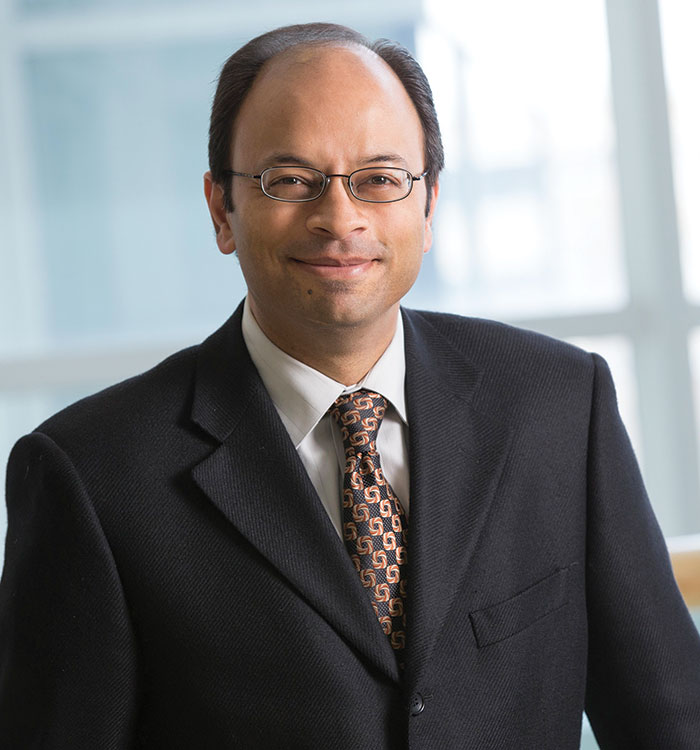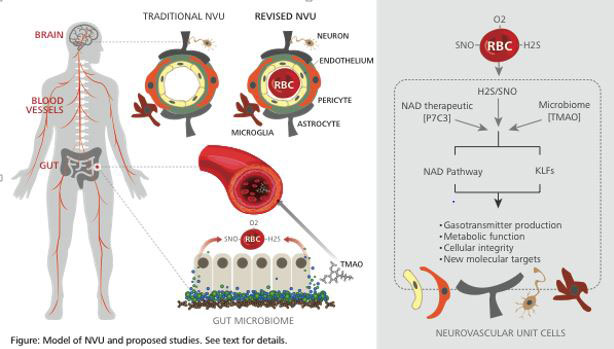Dementia Research Gets $9.6 million Grant
January 20, 2019
UH Chief Academic Officer to lead multi-institute research team
Innovations in Cardiovascular Medicine & Surgery | Winter 2019
Someone in the world is diagnosed with dementia every four seconds. According to the World Health Organization, 47.5 million people are living with dementia worldwide — a number that is projected to nearly triple by 2050. The burdens associated with the disease are staggering for patients, family members and healthcare providers. Furthermore, estimates of global dementia-related costs are $604 billion annually, and future dollars are expected to outpace disease prevalence rates.1
Despite bleak symptoms and statistics, there is a sense of hope that a medical breakthrough will one day halt or reverse the debilitating neurodegenerative disease. But what is the key to protecting the brain? For answers, physicians are searching their hearts.
 Mukesh Jain, MD
Mukesh Jain, MD“There is an increasing appreciation that the cardiovascular system may play a critical role in brain health,” says Mukesh K. Jain, MD, Chief Academic Officer for University Hospitals and cardiologist at University Hospitals Harrington Heart & Vascular Institute. In November 2018, Dr. Jain* and colleagues were awarded a $9.6 million grant by the American Heart Association/Allen Initiative in Brain Health and Cognitive Impairment, a collaborative funding effort launched last May by the AHA and the Paul Allen Frontiers Group, founded by the late philanthropist and co-founder of Microsoft Paul Allen.
“The brain is two percent of body mass but consumes 20 percent of energy to function day and night,” Dr. Jain says. “Every neuron in the brain has its own blood vessel. We believe diseases that affect these tiny tributaries are significant in all forms of dementia, including age-related dementia [ARD] and Alzheimer’s disease [AD].”
The four-year project, entitled Restoring the Neurovascular Unit, officially launched Jan. 1, 2019. Drawing on tissue banks, animal models and translational research, investigators will evaluate how the brain’s energy supply and pathways on a cellular level may impact neurological communication.
In particular, researchers are focused on how two cell types — red blood cells (RBC) and endothelium cells that line the microscopic vessels — are altered during aging and disease progression. Team members have targeted specific regulators that govern cellular function in hopes of developing compounds that will lead to effective therapeutics.
Key investigative questions include:
- How do RBC-derived gasotransmitters impact the neurovascular unit (NVU) and ARD/AD?
- How do molecular and genetic factors within the endothelium impact the neurovascular unit (NVU) and ARD/AD?
- Can targeting RBCs and/or the endothelium with effective therapeutics delay or reverse ARD/AD?
UH joins Stanford University and the Salk Institute for Biological Studies as one of three national recipients of this prestigious funding initiative. As Program Director, Dr. Jain is leading a distinguished team of researchers at UH, Johns Hopkins University and the University of Pennsylvania. Ongoing collaboration will be augmented by quarterly phone calls and annual meetings.
 Resource: UH AHA Allen Proposal 2018
Resource: UH AHA Allen Proposal 2018The team working on dementia research
University Hospitals Cleveland Medical Center:
- Mukesh K. Jain, MD, Chief Academic Officer, University Hospitals Health System; Chief Scientific Officer, Harrington Discovery Institute; Chief Research Officer, UH Harrington Heart & Vascular Institute
- Andrew Pieper, MD, PhD, Co-Program Director, Harrington Discovery Institute, Department of Psychiatry
- Alan Lerner, MD, Brain Health and Memory Center, University Hospitals Neurological Institute
- James Reynolds, PhD, Harrington Discovery Institute, Department of Anesthesiology
- Jonathan S. Stamler, MD, President, Harrington Discovery Institute; Robert S. and Sylvia K. Reitman Family Foundation Distinguished Chair of Cardiovascular Innovation
Johns Hopkins University:
- Solomon Snyder, MD, PhD, Department of Neuroscience
University of Pennsylvania:
- Zoltan Arany, MD, PhD, Penn Cardiovascular Institute, Department of Medicine
- Alice Chen-Plotkin, MD, Department of Neurology
- Rajan Jain, MD, Penn Cardiovascular Institute, Department of Medicine
- Mark Kahn, MD, PhD, Penn Cardiovascular Institute, Department of Medicine
- John Trojanowski, MD, PhD, Pathology and Laboratory Medicine
“I am honored to head this multidisciplinary team of eminent leaders in cardiovascular medicine and neurobiology to advance a novel scientific concept that will transform our understanding of the critical determinants underlying brain health,” Dr. Jain says. “Each member of the team brings a unique perspective and expertise. I am confident our findings will accelerate development of novel therapies that will help us better treat age-related dementia.”
Mukesh Jain, MD, is Chief Academic Officer, University Hospitals Health System; Chief Scientific Officer, Harrington Discovery Institute; Chief Research Officer, UH Harrington Heart & Vascular Institute; and Professor, Department of Medicine, Case Western Reserve School of MedicineFor more information, email Mukesh.Jain@HarringtonDiscovery.org.
*Effective December 2021, the project has been transitioned under Andrew Pieper, MD, PhD, Director, Center for Brain Health Medicines at Harrington Discovery Institute, program director for the $9.6 million grant, entitled Restoring the Neurovascular Unit, awarded to three members of Harrington Discovery Institute at University Hospitals in 2018 for their research into brain health related to aging. This funding from the American Heart Association-Allen Initiative in Brain Health and Cognitive Impairment will help these researchers identify new ways to protect people from cognitive decline. The distinguished team is comprised of Jonathan S. Stamler, MD, President of Harrington Discovery Institute and Dr. Pieper.
REFERENCES
1. Fact file: 10 Facts on Dementia. The World Health Organization (WHO). https://www.who.int/features/factfiles/dementia/dementia_facts/en/


